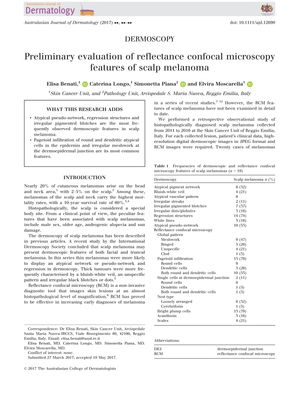TLDR Reflectance confocal microscopy is useful for diagnosing scalp melanomas, which have features similar to those on the trunk.
The document reports on a retrospective observational study from the Skin Cancer Unit of Reggio Emilia, Italy, which assessed scalp melanoma characteristics using dermoscopy and reflectance confocal microscopy (RCM) from 2011 to 2016. The study involved 19 cases of histopathologically confirmed scalp melanoma, primarily in bald men over 65 years old, with the superficial spreading type being most common. Dermoscopic analysis identified regression, atypical pseudo-network, and irregular pigmented blotches as frequent features, while RCM revealed irregular meshwork and pagetoid infiltration of atypical cells as common patterns. The study concluded that RCM is a useful diagnostic tool for scalp melanomas, which show similar features to trunk melanomas, but emphasized the need for further research with larger sample sizes to corroborate these findings.
 37 citations
,
January 2016 in “Australasian Journal of Dermatology”
37 citations
,
January 2016 in “Australasian Journal of Dermatology” Scalp melanomas are more dangerous and often missed, needing earlier detection.
 34 citations
,
July 2011 in “Journal of the European Academy of Dermatology and Venereology”
34 citations
,
July 2011 in “Journal of the European Academy of Dermatology and Venereology” The study concluded that scalp tumors show different patterns based on age, gender, and tumor thickness, and emphasized the importance of early detection and scalp examinations.
 3 citations
,
October 2021 in “Clinical, Cosmetic and Investigational Dermatology”
3 citations
,
October 2021 in “Clinical, Cosmetic and Investigational Dermatology” Scalp melanoma, a deadly skin cancer, is often found late due to its hard-to-see location, especially in older men. Early detection, possible treatments, and the role of hairdressers in spotting it early are discussed. More research is needed to improve detection and treatment.

Melanoma characteristics vary by age, which could help doctors with diagnosis and prevention.
 4 citations
,
April 2020 in “Dermatology practical & conceptual”
4 citations
,
April 2020 in “Dermatology practical & conceptual” Reflectance confocal microscopy is useful for diagnosing and monitoring skin diseases, but it has limitations and requires expertise for correct use.
13 citations
,
March 2021 in “Frontiers in oncology” Reflectance confocal microscopy reliably identifies skin cancer features like horizontal skin tissue sections.

New imaging tools help doctors better examine hair and scalp health without surgery.






